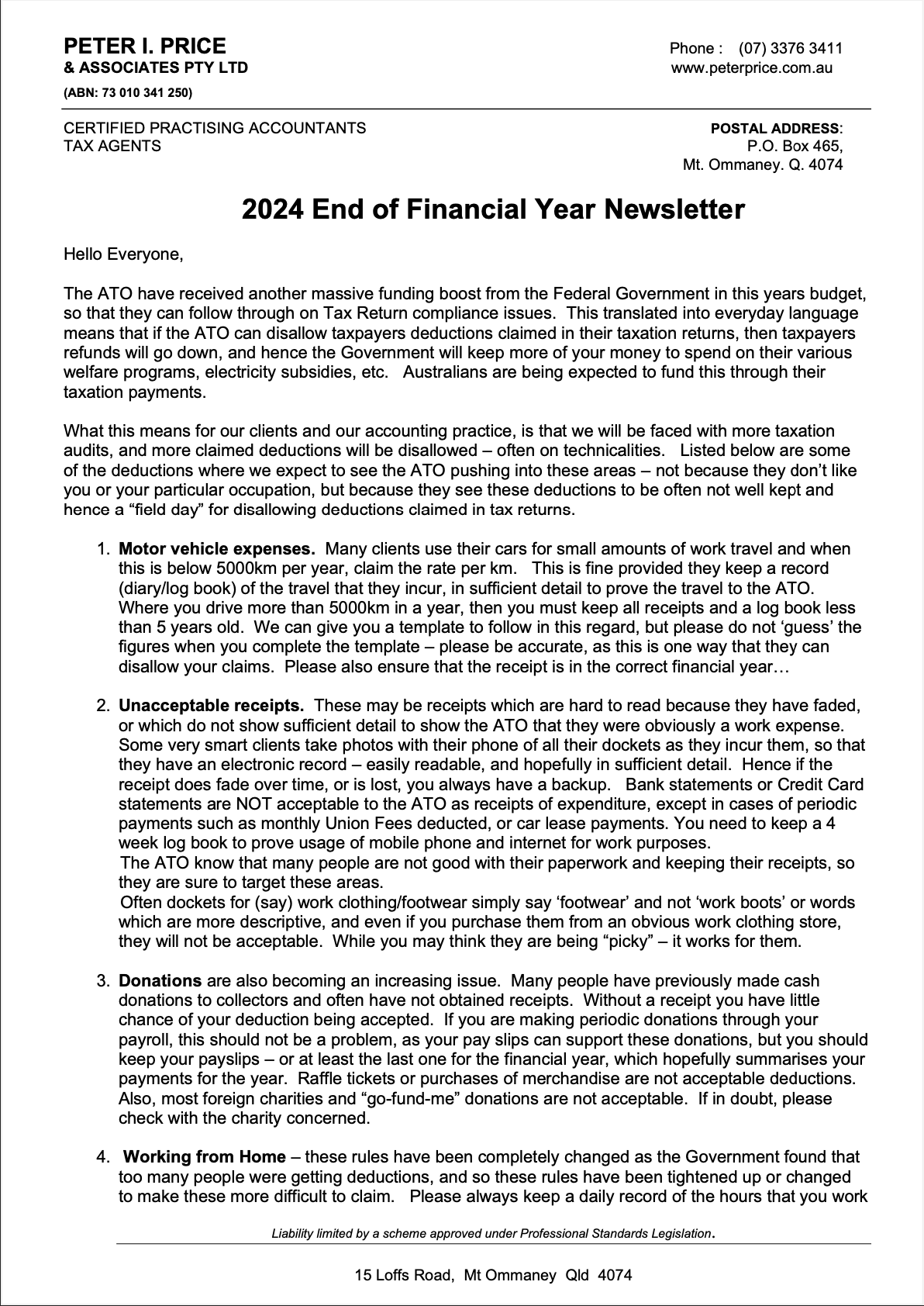2025 Tax Planning Guide Part 1

.
CONSIDER THE FOLLOWING OPPORTUNITIES
1. Delay Deriving Assessable Income
If it is possible, delay deriving income until after June 30, 2025 by:
a. Delaying the Timing of the generation of Income until after June 30.
b. Look at the timing of when Invoices are raised for incomplete work.
Off course, cash flow for your business is paramount but if this is not adversely affected, then consider deferring the recognition of income until after 30 June 2025. For example:
- Cash Basis Income - Some income is taxable on a cash receipts basis rather than on an accruals basis (e.g. rental income or interest income in certain cases). You should consider whether some income can be deferred in those instances.
- Consider delaying your invoices to customers until after July 1 which will put that income into the next financial year and defer the tax payable on that income. If you operate on the cash basis of accounting you simply need to delay receiving the money from your customers until after June 30.
- Lump Sum Amounts - If a lump sum payment to you is likely to be received close to the end of a financial year, you could consider the question of whether this amount (or part thereof) can be delayed or spread over future periods.
2. Bringing Forward Deductible Expenses or Losses
Prepayment of Expenses - In some circumstances, a small business or individual who derive passive income (such as rental income and dividends) should consider pre-paying expenses prior to 30 June 2025. A tax deduction can be brought forward into this financial year for expenses like:
- Employee Superannuation Payments including the 11.5 % Superannuation Guarantee Contributions for the June 2025 quarter (that have to be received by your Superannuation Fund by June 30, 2025 to claim a tax deduction. Anything received by your Superannuation Fund after this date is not deductable in the 2024-25 financial year).
- Working from home. You will need to have kept records of the hours you worked from home. This is used to calculate the amount you can claim.
- Superannuation for Business Owners, Directors and Associated Persons.
- Wages, bonuses, commissions and allowances
- Contractor Payments
- Travel and accommodation expenses
- Trade creditors
- Rent prepayment for up to 12 months
- Insurances including Income Protection Insurance
- Printing, Stationery and Office Supplies
- Advertising including Directory Listings
- Utility Expenses - Telephone, Electricity & Power
- Motor Vehicle Expenses - Registration and Insurance
- Accounting Fees
- Subscriptions and Memberships to Professional Associations and Trade Journals
- Repairs and Maintenance to Investment Properties
- Self-Education Costs
- Home Office Expenses – desk, chair, computers etc.
- Donations to deductible gift recipient organisations
- If appropriate, consider prepaying any deductible investment loan interest. This could include interest payments on an investment loan for either an investment or commercial property or an investment portfolio you hold.
If you are planning to make any deductions like those listed above, then it is advisable that you discuss your plans with your accountant before you act. Also, such a deduction for prepaid expenses will need to be paid before 30 June 2025. Be careful, though, don’t purchase goods or services you will never use, and be aware of the effect of such spending on your cash flow.
Superannuation Contributions - some low or middle-income earners who make personal (after-tax) contributions to a superannuation fund may be entitled to the government co-contribution. The amount of government co-contribution will depend on your income and how much you contribute. So be aware of any thresholds that relate to the Government’s co-Contribution scheme.
Capital Gains/Losses – Note that the contract date (not the settlement date) is often the key sale date for capital gains tax purposes and when it comes to the sale of an asset that triggers a capital gain or capital loss, you need to consider your overall investment strategy when making the decision to sell. Here are several important points regarding the management of capital gains and capital losses on sale of your assets from a tax planning perspective:
- If appropriate, consider deferring the sale of an asset with an expected capital gain (and applicable capital gains tax liability) until it has been held for 12 months or longer. By doing so, you could reduce your personal income tax. For example, if you hold an asset for under 12 months, any capital gain you make may be assessed in its entirety upon the sale of that asset.
- A capital gain will be assessable in the financial year that it’s crystallised.
- If appropriate, consider deferring the sale of an asset with an expected capital gain (and applicable capital gains tax liability) to a future financial year. By doing so, you could help reduce your personal income tax for the current financial year. This could also be of benefit if, for example, you expect that your income will be lower in future financial years compared to the current financial year.
- If appropriate, consider offsetting a crystallised capital gain with an existing capital loss (carried forward or otherwise) or bringing forward the sale of an asset currently sitting at a loss. By doing so, you could reduce your personal income tax in this financial year.
- Note that a capital loss can only be used to offset a capital gain.
Accounts Payable (Creditors) - If you operate on an accruals basis and services have been provided to your business, ensure that you have an invoice dated June 30, 2025.
Acctweb

